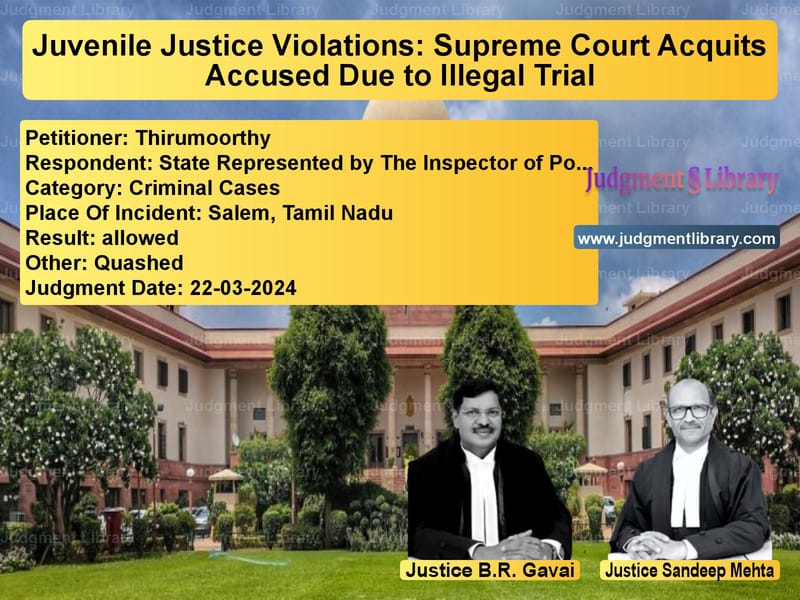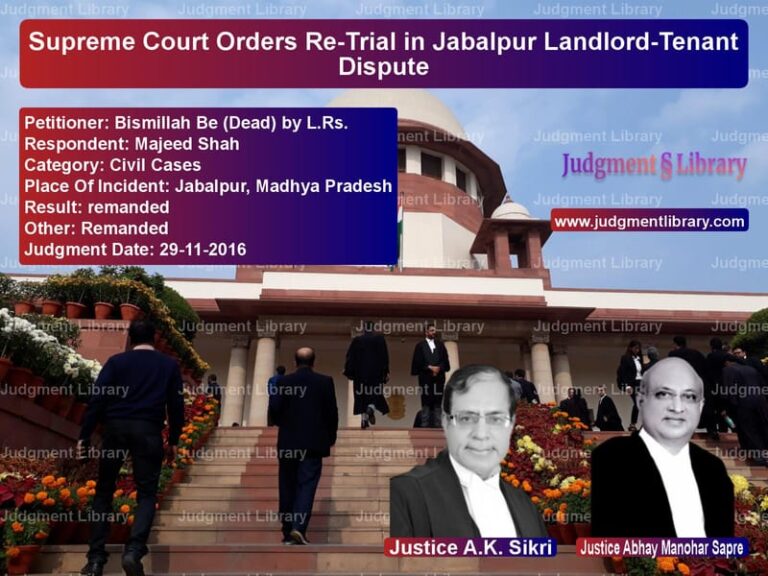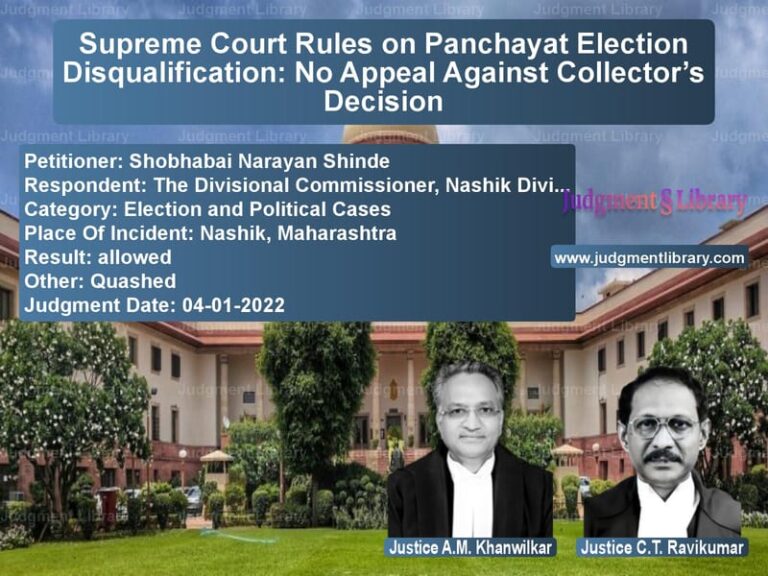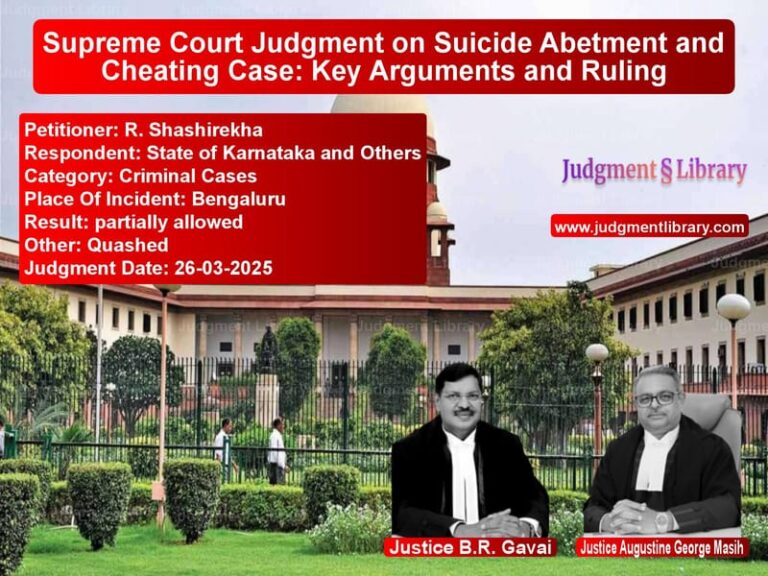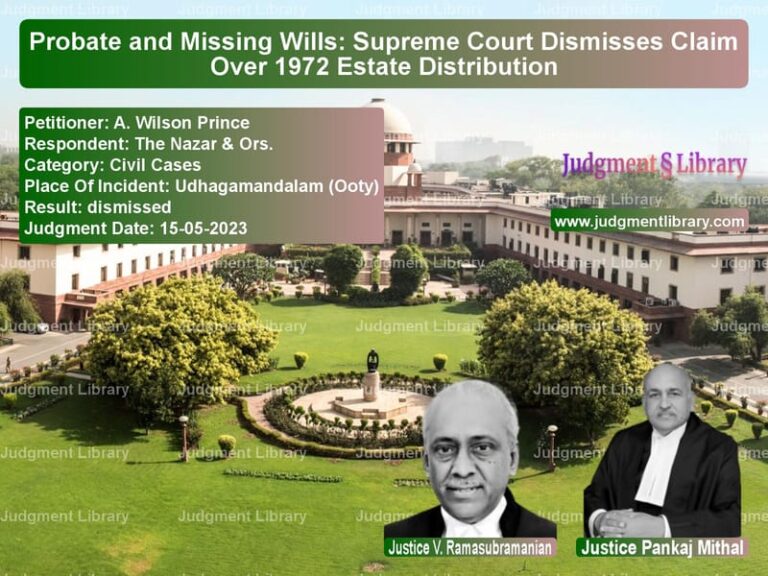Juvenile Justice Violations: Supreme Court Acquits Accused Due to Illegal Trial
The Supreme Court of India has recently overturned the conviction of Thirumoorthy, a juvenile in conflict with law (CICL), ruling that his trial was conducted in blatant violation of the mandatory provisions of the Juvenile Justice (Care and Protection of Children) Act, 2015 (JJ Act). This landmark judgment underscores the importance of adhering to procedural safeguards while prosecuting juveniles, ensuring they receive fair treatment under the law.
Background of the Case
The case arose from an incident on July 2, 2016, when a six-year-old girl, Ms. D, went missing in Salem, Tamil Nadu. The next morning, her father, Mr. G (PW-1), lodged a police complaint, stating that he had last seen his daughter at 6:00 PM the previous evening. Despite a search, the child could not be found.
During the investigation, local witnesses (PW-10 and PW-11) claimed they had seen the accused, Thirumoorthy, taking the child into his house. Based on this information, the police apprehended the accused. Upon interrogation, the accused allegedly confessed, and his statement led to the discovery of the child’s dead body, concealed in an aluminum vessel in his prayer room.
Read also: https://judgmentlibrary.com/supreme-court-cancels-bail-of-accused-in-ghaziabad-murder-case/
The forensic report concluded that the child was strangled, suffered asphyxiation, and had injuries to her genitalia. Based on this evidence, the accused was charged under the following provisions:
- Section 363 IPC – Kidnapping
- Section 342 IPC – Wrongful confinement
- Section 6 of the POCSO Act – Aggravated sexual assault
- Section 302 IPC – Murder
- Section 201 IPC – Causing the disappearance of evidence
Trial and Conviction
The Trial Court (Mahila Court, Salem) convicted the accused on February 18, 2019, and sentenced him to:
- 10 years of rigorous imprisonment under Section 6 of the POCSO Act
- 10 years for murder under Section 302 IPC
- 7 years under Section 363 IPC (kidnapping)
- 1 year under Section 342 IPC (wrongful confinement)
- 7 years under Section 201 IPC (causing the disappearance of evidence)
The Madras High Court upheld the conviction on April 15, 2021. The case then reached the Supreme Court, where the accused challenged the legality of his trial.
Key Issues Before the Supreme Court
- Was the accused a juvenile at the time of the offense?
- Did the trial adhere to the mandatory provisions of the Juvenile Justice Act?
- Was there a failure to conduct a preliminary assessment before prosecuting the accused as an adult?
- Should the trial proceedings be considered void due to non-compliance with the JJ Act?
Arguments by the Petitioner (Accused)
The defense raised several crucial points:
- The accused was born on May 30, 2000, making him 16 years and one month old at the time of the crime, legally classifying him as a child in conflict with law (CICL).
- The police, prosecution, and trial court were fully aware of the accused’s juvenile status from the beginning.
- The case was never forwarded to the Juvenile Justice Board (JJB) as required under Section 9(1) of the JJ Act.
- No preliminary assessment was conducted under Section 15 of the JJ Act to determine whether the accused should be tried as an adult.
- The confession obtained in police custody was inadmissible and violated the general principles of juvenile justice.
- The accused was deprived of his right to appeal under Section 101(2) of the JJ Act against being tried as an adult.
Arguments by the Respondent (State of Tamil Nadu)
The prosecution countered the defense claims with the following arguments:
- The trial court was designated as a Children’s Court and had the authority to try the case.
- Despite procedural irregularities, the nature of the crime warranted a trial as an adult.
- The trial court considered the accused’s psychological evaluation before sentencing him.
- The High Court had upheld the conviction based on strong circumstantial evidence.
Supreme Court’s Key Observations
The Supreme Court found serious violations of the Juvenile Justice Act:
“The fact that the accused was a child in conflict with law was known to the Investigating Officer, prosecution, and trial court from the beginning. Despite this, the case was never forwarded to the Juvenile Justice Board, and no preliminary assessment was conducted.”
The Court highlighted the mandatory procedure under Sections 15 and 19 of the JJ Act:
- Juveniles accused of heinous offenses (above 16 years) must undergo a preliminary assessment by the JJB.
- The JJB must determine if the child should be tried as an adult and provide reasons.
- The child has a right to appeal against this decision under Section 101(2) of the JJ Act.
Final Judgment
The Supreme Court declared the entire trial illegal and ruled that:
- The trial court’s proceedings were null and void due to non-compliance with the JJ Act.
- The accused’s conviction and sentence were quashed.
- The accused was ordered to be released immediately, provided he was not required in any other case.
Implications of the Judgment
This verdict serves as a strong precedent reinforcing the rights of juveniles under the JJ Act. Key takeaways include:
- Failure to follow the JJ Act’s procedural safeguards can invalidate an entire trial.
- Courts must ensure juveniles undergo a preliminary assessment before being tried as adults.
- Confessions obtained in police custody cannot be used against juveniles.
- Juvenile offenders must be tried in accordance with the principles of reformative justice.
The ruling strengthens the legal framework protecting minors in conflict with the law, ensuring that they are dealt with fairly and as per statutory guidelines.
Petitioner Name: Thirumoorthy.Respondent Name: State Represented by The Inspector of Police.Judgment By: Justice B.R. Gavai, Justice Sandeep Mehta.Place Of Incident: Salem, Tamil Nadu.Judgment Date: 22-03-2024.
Don’t miss out on the full details! Download the complete judgment in PDF format below and gain valuable insights instantly!
Download Judgment: thirumoorthy-vs-state-represented-by-supreme-court-of-india-judgment-dated-22-03-2024.pdf
Directly Download Judgment: Directly download this Judgment
See all petitions in Juvenile Justice
See all petitions in Judgment by B R Gavai
See all petitions in Judgment by Sandeep Mehta
See all petitions in allowed
See all petitions in Quashed
See all petitions in supreme court of India judgments March 2024
See all petitions in 2024 judgments
See all posts in Criminal Cases Category
See all allowed petitions in Criminal Cases Category
See all Dismissed petitions in Criminal Cases Category
See all partially allowed petitions in Criminal Cases Category

